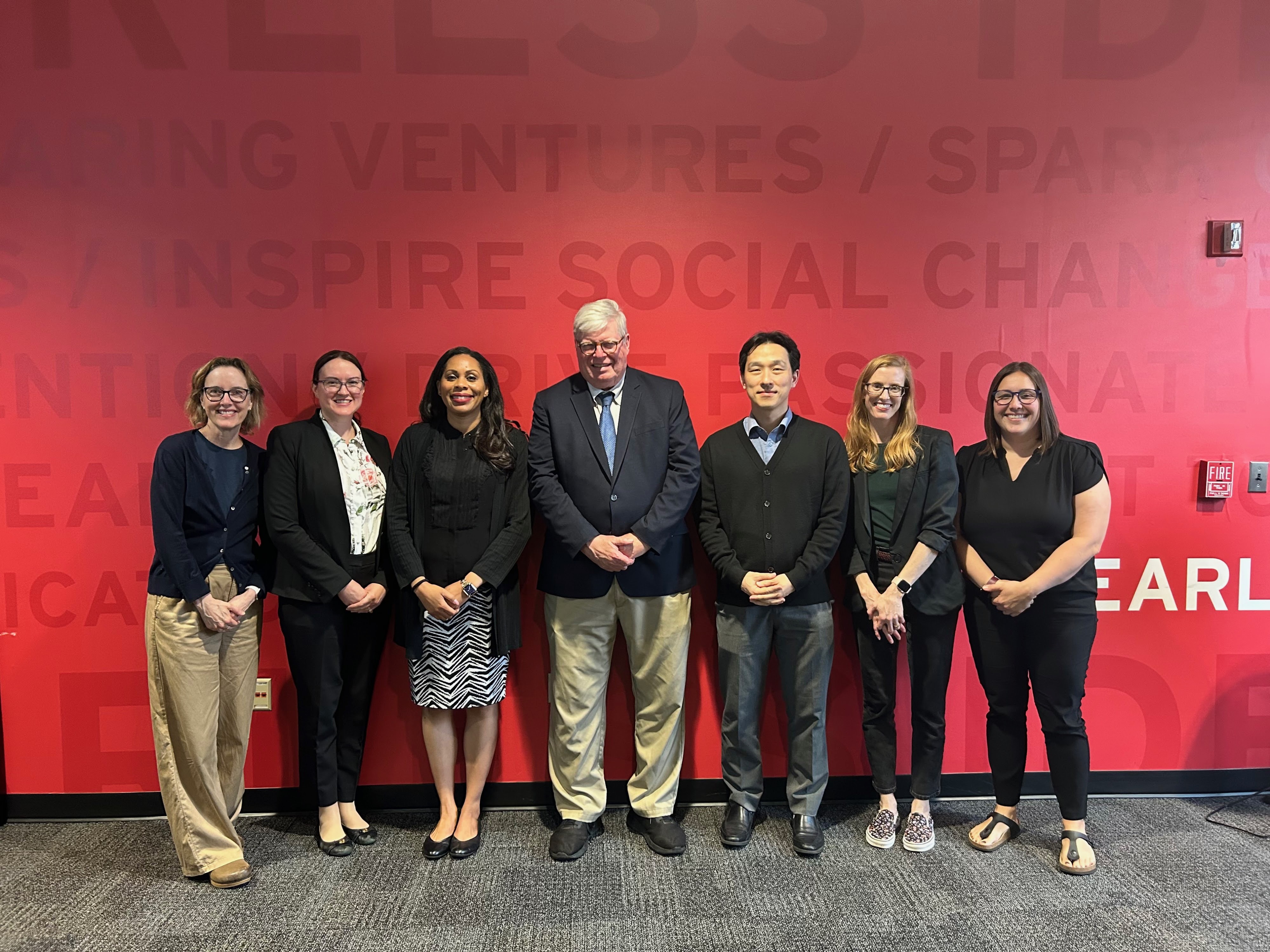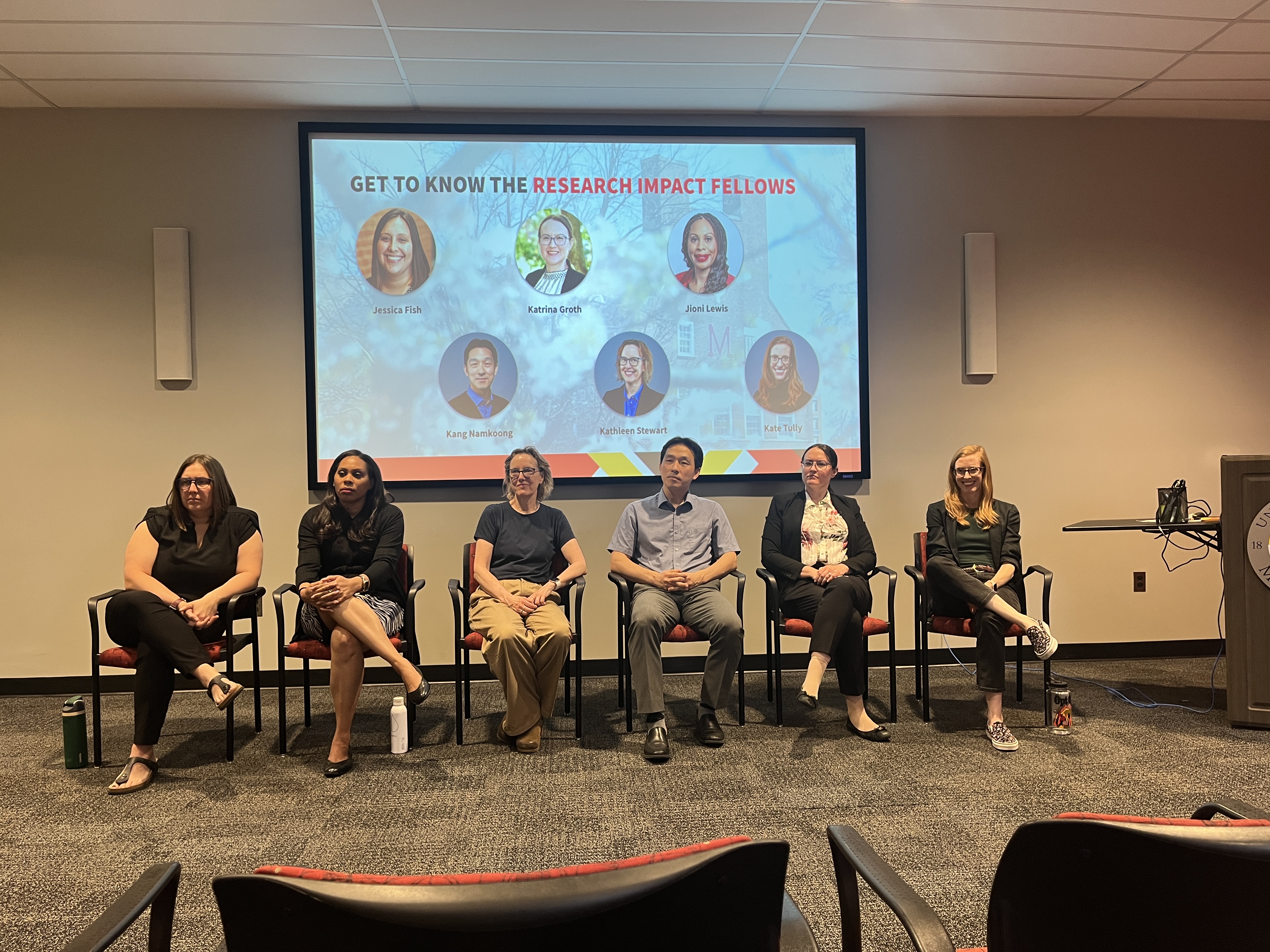The second cohort of the University of Maryland Research Impact Fellows was honored for their achievements on May 15, 2025. Research Impact Fellows is a 9-month collaborative program coordinated by UMD’s Office of Marketing and Communications (OMC) and Division of Research designed to equip university research leaders with the skills and resources needed to communicate about their research findings and expertise to general audiences and key stakeholders.
The 2024-25 Research Impact Fellows included Kate Tully from the College of Agriculture & Natural Resources, Katrina Groth from the A. James Clark School of Engineering, Jessica Fish, from the School of Public Health, Jioni A. Lewis from the College of Education, Kathleen Stewart from the College of Behavioral and Social Sciences, and Kang Namkoong from the College of Arts and Humanities. Together, they have expertise in mental health, gender and racial discrimination and disparities, health and safety communications, food production sustainability, geospatial intelligence, and energy systems.
The Fellows participated in interactive, results-focused sessions with communications experts from OMC. They honed their skills in developing key messages, incorporating visual aids, utilizing UMD communications platforms, and engaging with government agencies to underscore the value of their research. By the end of the program, the Fellows left with tailored materials including updated graphics, custom video pitch and pitch plans, and strategies for their social media platforms.

“Our main goal is to help our faculty communicate what their research means with the media and the general public and explain how their work can help impact the lives of many communities both near and far,” said Vice President for Research Gregory Ball.
Throughout the program, the Fellows employed their newly-honed skills by engaging with the media and commenting on breaking news related to their fields of expertise. Katrina Groth was featured in the latest issue of Electrical Apparatus magazine where she weighed in on the ongoing debate between hydrogen fuel cell electric vehicles (FCEVs) and battery electric vehicles (BEVs), offering her expert perspective on the future of sustainable transportation. Showcasing her expertise, Jessica Fish was quoted in a Vox article discussing the implications of state policies and their implications for LGBTQ youths in schools. In addition, Kate Tully was spotlighted in the documentary and article “An American River” by CBS News, where she flexed her expertise in saltwater intrusion and practiced her skills at video interviewing.
As their final task, the Research Impact Fellows presented a two-minute pitch and answered questions related to their research and experiences to an audience of communication professionals. They reminisced about their experiences as Research Impact Fellows, including the lessons they learned, the connections they established, and what the future holds for their research.
When asked what their favorite aspect of the Research Impact Fellows program was, Katrina Groth commented that knowing how to tailor her points depending on who she is talking to has helped her communicate the importance of her work to multiple stakeholders: “I have learned how to tailor my message with just a few subtle changes to meet people where they are at and still staying true to my research. Just like Kate does so well!”
“Receiving feedback from the experts at OMC has really helped me realize what words to cut when discussing my research and which ones to highlight to get my point across,” Kathleen Stewart added. In tandem, Jioni Lewis stated, “Yes! I can finally say my three key messages in a way that anyone can understand and accommodate depending on my audiences’ grasp of the topic.”
The Research Impact Fellows were also asked if this experience has changed the way they teach or talk to other experts in the field about their research. Kate Tully mentioned that this process has helped her state her points first and get to her key messages faster in every scenario. “Sometimes I talk too much when trying to explain something,” Tully said. “I can now deliver my message in fewer words so I do not lose my audience’s attention.”

Kang Namkoong agreed. “The Fellows program helped me create a 1-minute, 3-minute, 5-minute, even an hour plan for how to discuss my work and I can minimize or expand as needed depending on the time I am allotted,” said Namkoong.
Jessica Fish responded with how she tackles discussions with her peers in research. “I have used these new skills to have conversations with colleagues in national settings,” she said. “As researchers, we tend to be unequipped to tell important narratives in ways that matter. To beat misinformation, we need to get better at telling compelling stories and the Research Impact Fellows Program has taught me just that.”
The Research Impact Fellows are on Linkedin, where they continue to perfect their skills, communicate about their work, and tell the stories that matter: Kathleen Stewart’s LinkedIn, Jioni Lewis’ LinkedIn, Jessica Fish’s LinkedIn, Katrina Groth’s LinkedIn, Kate Tully’s LinkedIn
For more information on the Research Impact Fellows Program, visit go.umd.edu/RIF
